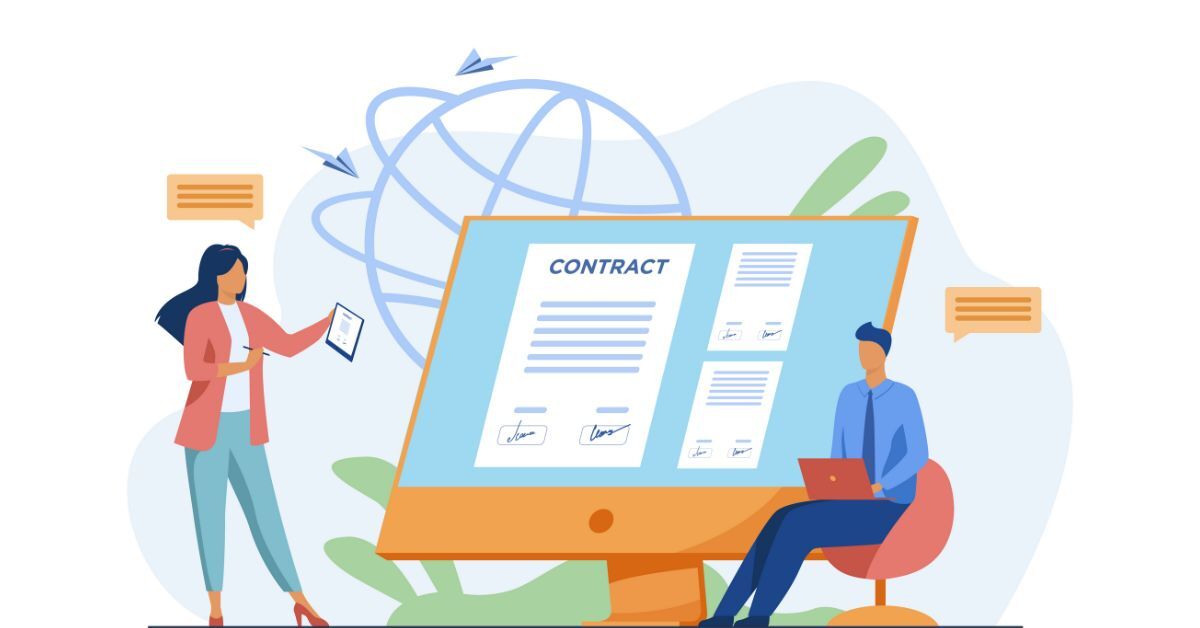Effective contract management is essential for enterprises of all sizes in order to build and manage their relationships with external parties, be it contractors, freelancers, or suppliers. The process involves creating, negotiating, executing, and monitoring contracts to ensure that both parties fulfil their obligations and achieve the set outcomes effectively. One of the most common types of contracts enterprises deal with is vendor agreements. This article explores the concept of vendor contract management, the risks involved, and how AI-based contract management can simplify bulk vendor management for enterprises.
What is Vendor Contract Management?
Vendor Contract Management is a process of managing the different contracts an enterprise may have with its external vendors. It involves creating and negotiating contracts, monitoring their execution, renewing the terms of the agreement, etc. Vendors control the entire supply chain for any enterprise, making it essential for the business to implement robust vendor contract management practices. Improper management of vendor contracts poses a myriad of risks to enterprises, which can significantly impact operations, finances, and overall business stability.
Risks Involved with Vendor Contract Management
Managing vendors requires setting proper terms and conditions relating to the responsibilities of the parties, payment terms, duration of the association, and indemnity against performance failure. If an enterprise fails to establish and enforce proper procedures to manage its relationships with external suppliers, the business can be exposed to severe risks. Here are some of the most common threats associated with improper vendor contract management:
Financial Risks
Oversight in contract management can lead to unexpected financial losses for an enterprise, including cost discrepancies, unanticipated legal fees, or billing errors. These may go unnoticed without proper scrutiny, leading to overpayments or financial disputes, and can strain the enterprise’s budgets and affect its overall profitability.
Legal and Regulatory Non-Compliance
Contracts generally have certain legal and regulatory obligations that must be complied with. Improper vendor contract management can also lead to non-compliance, exposing the enterprise to legal threats and penalties. Failure to adhere to industry standards or changes in regulations can also result in litigation, fines, and damage to the company’s reputation.
Operational Risks
Unclear contract terms, especially regarding service levels, delivery timelines, or performance expectations, can severely affect the operation of an enterprise. Vendors failing to meet agreed-upon performance standards can affect the enterprise’s ability to deliver products or services on time, leading to customer dissatisfaction and potential business losses.
Security and Data Breaches
Vendor contracts often involve the exchange of sensitive information, and inadequate security terms in contracts can increase the risk of data breaches. This is particularly critical in industries where data protection and privacy are paramount, and a breach can lead to legal consequences and loss of customer trust.
Quality and Performance Issues
Vendors may not consistently meet quality standards or performance expectations without proper monitoring. This can result in the delivery of subpar products or services, negatively impacting the organisation’s own products or services.
Supply Chain Disruption
If vendor contracts do not include contingency plans or if there is insufficient oversight, events such as natural disasters, geopolitical issues, or financial instability on the part of the vendor can disrupt the supply chain and harm business continuity.
Hidden Costs
Carelessly managed contracts may have potential costs and liabilities that are not easily identifiable. Overlooking clauses related to termination fees, penalty clauses, or change orders can result in unexpected financial obligations of an enterprise.
It is, therefore, critical for an enterprise to incorporate the right practices for robust contract management to mitigate these risks, protect its financial interests, and ensure the sustainability of its association with its vendors.
Key Tips for Optimising Vendor Contract Management of an Enterprise
Effective vendor contract management involves using the right tools and implementing the right strategies that protect an enterprise’s external partnerships and overall operational efficiency. The process of vendor contract management involves ensuring that all contracts are appropriately managed throughout the entire lifecycle, right from contract creation to termination. Some of the essential tips for effective vendor contract management include:
Clarity in Scope
To avoid misunderstandings and disputes, it is crucial to define the products or services covered by the contract explicitly. This can help both parties to align their expectations and reduce the risk of disagreements during the contract term.
Proper Due Diligence
Before entering into contracts with vendors, it is essential to conduct comprehensive due diligence, including an assessment of their financial stability, reputation, and track record. Understanding the vendor’s capabilities and reliability is essential for an enterprise to make informed business decisions and avoid potential risks.
Detailed Contract Terms
It is essential to prepare comprehensive and well-defined contract terms that lay down all aspects of the vendor association, such as pricing, delivery schedules, quality standards, and performance metrics. This way, the enterprise can minimise the chances of disputes and easily identify the performance of its vendors.
Setting Key Performance Indicators (KPIs)
Establishing measurable key performance indicators (KPIs) is essential for evaluating vendor performance as they can provide quantifiable insights into the effectiveness of the vendor relationship. Regularly evaluating and discussing KPIs with vendors can improve collaboration and accountability.
Use of Technology and Automation
Contract processes of an enterprise can be easily streamlined by integrating the right contract lifecycle management (CLM) tools. AI-driven CLM tools can automate a large part of tasks relating to contract creation, negotiation, execution, and continuous management. Automation can also reduce the risk of human errors and help the enterprise track compliance by vendors with contract terms.
What is the contract period in vendor management?
Contract period in vendor management is the defined time-frame during which a legally binding contract stays in effect between a the vendor and the buyer or a business for delivery of goods or services. The period specifies the duration of the contract and is the main component of a contract lifecycle. It can be short term or long term depending on the business requirements.
Vendor Contract Management with AI
Vendor contract management, when performed by integrating good AI-driven contract lifecycle management (CLM) software, can help an enterprise in multiple ways. With features like a centralised repository, data insights, task automation, reminders, and performance tracking, a contract management tool can enable an enterprise to assess its vendor relationships, contract execution and more constantly.
Vendor Contract Creation
Firstly, a good contract lifecycle management tool can facilitate the drafting of contracts through the use of templates, standardised clauses, and a collaborative platform for all parties involved in the contract. The AI-driven tool can identify patterns, clauses, and language structures that align with industry standards and compliance requirements by analysing vast datasets of historical contracts. This not only speeds up the drafting process but also ensures that contracts adhere to best practices, reducing the risk of errors and misunderstandings. By automating routine tasks, a CLM tool allows contract managers to focus on more complex aspects of negotiation and value optimisation.
Vendor Contract Negotiation
Machine learning algorithms of an AI-based contract management software can analyse large volumes of contracts and identify the right terms, helping negotiators make more informed decisions. Such a tool also comes with contract version control and real-time collaboration, which enable multiple parties to contribute to the contract in a structured manner. This reduces the risk of communication issues and speeds up the entire negotiation process.
Vendor Contract Execution
The execution phase can be significantly streamlined by CLM tools, especially when it comes to managing signatures and contract version approvals. AI-driven contract management platforms often integrate e-signature, automating the signing process and reducing the time it takes to move contracts through the approval workflow. This not only speeds up the execution but also enhances the security and traceability of the signing process. It also reduces the need for physical paperwork, and workflow automation reduces bottlenecks.
Vendor Contract Performance
An AI-based contract management software also allows ongoing contract management through a centralised repository for contracts, making it easy to track key dates, obligations, and performance metrics. Automated alerts and notifications help contract managers stay proactive in managing renewals, compliance requirements, and other critical milestones. By using natural language processing (NLP) capabilities, the AI can extract valuable insights from unstructured data within contracts.
Vendor KPI Management
CLM tools for vendor contract management also come with automated analytics and reporting features that allow enterprises to track and measure vendor performance against set benchmarks. This data-driven practice helps the enterprise to make more informed decisions and identify areas for improvement, renegotiation, or termination of contracts.
Vendor Risk Management
Risk management is an important part of the entire vendor contract management process, and incorporating a contract management system can help enterprises identify potential risks by tracking changes in the regulatory landscape, financial stability of vendors, and other external factors. Alerts and reporting features also help enterprises promptly identify and mitigate risks, ensuring flexibility in vendor relationships. AI tools can also monitor changes in the regulatory landscape, financial health of vendors, and external events and provide timely warnings and insights into potential risks.
To Conclude
Vendor contract management with contract lifecycle management (CLM) tools like LegisTrak can help enterprises transform and optimise each stage of their contract lifecycle. With the world moving rapidly towards digital transformation, integrating CLM tools into vendor contract management practices becomes imperative for enterprises wishing to thrive in a highly competitive and fast-moving business environment. By leveraging the power of AI, enterprises can not only enhance collaboration but also reduce risks and increase the value they receive from their vendor relationships.





